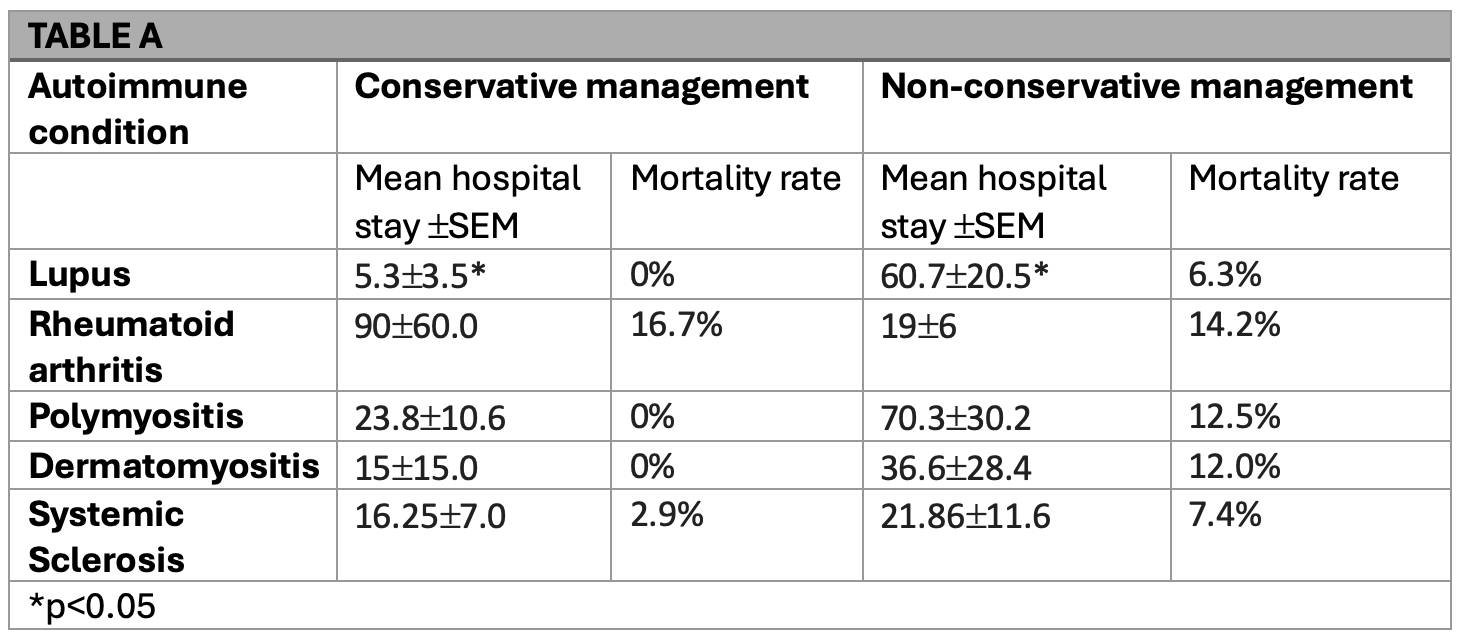Sunday Poster Session
Category: Small Intestine
P1931 - Conservative Management of Pneumatosis Intestinalis and Pneumoperitoneum in Patients With Autoimmune Conditions May Be Associated With Improved Clinical Outcomes
Sunday, October 26, 2025
3:30 PM - 7:00 PM PDT
Location: Exhibit Hall

Himaben Gohil, DO, MSc (she/her/hers)
University at Buffalo
Buffalo, NY
Presenting Author(s)
Himaben Gohil, DO, MSc1, Ravneet Kaur, DO2, Mark Rayev, DO1, Lan Nguyen, DO1, Edward Tamale, MD1, Xavier Zonna, DO1, Alexander Zhu, DO1, Randy Cheung, MD2
1University at Buffalo, Buffalo, NY; 2University of Buffalo, Buffalo, NY
Introduction: Pneumatosis intestinalis (PI) is a rare condition characterized by the presence of gas within the bowel wall and can be linked with pneumoperitoneum (PM). PI can be a rare gastrointestinal complication of autoimmune conditions. Herein, we aim to study the effect of conservative management versus antibiotics/surgical interventions in patients with PI/PM.
Methods: A systematic literature search was conducted on PubMed between 1978 to 09/2024 on case reports of patients with PI/PM and lupus erythematosus (lupus), rheumatoid arthritis (RA), polymyositis, dermatomyositis, or systemic sclerosis. This yielded 105 case reports with 146 patients. Age, sex, medical history, presenting symptoms, physical exam findings, imaging, laboratory values, and treatment modalities were recorded. Within the autoimmune condition type, patients were divided into two groups: those managed conservatively with only supportive care and those managed non-conservatively with antibiotics and/or surgical intervention. The two groups were comparable in terms of mean age, co-morbidities, steroid use, prior hospitalization, and severity of presenting illness. All-cause mortality and hospital stay length were compared between the groups using mean± standard error of mean (SEM).
Results: The mean hospital stay with SEM and mortality rates are listed in Table A. Lupus patients with PI managed conservatively had a statistically significant reduction in hospital stay compared to those managed non-conservatively. Although not statistically significant, the mortality rate was lower in the conservatively managed lupus group compared to those non-conservatively managed. A similar trend was observed for patients with PI and dermatomyositis, polymyositis, and systemic sclerosis. However, patients with PI and RA who were managed conservatively showed a trend towards a longer hospital stay and higher mortality rate than those managed non-conservatively.
Discussion: Conservatively managed lupus patients had a significantly shorter hospital stay. Similar trends of reduced hospital stay, and mortality were observed in polymyositis, dermatomyositis, and systemic sclerosis, though not statistically significant due to limited sample sizes. Conversely, conservatively managed RA patients had increased hospital stay and mortality. Therefore, conservative management may benefit autoimmune patients with PI/PM, except those with RA.

Figure: Table shows the mean hospital stay with standard error of mean and mortality rate for lupus, rheumatoid arthritis, polymyositis, dermatomyositis, and systemic sclerosis. * is indicative of p<0.05.
Disclosures:
Himaben Gohil indicated no relevant financial relationships.
Ravneet Kaur indicated no relevant financial relationships.
Mark Rayev indicated no relevant financial relationships.
Lan Nguyen indicated no relevant financial relationships.
Edward Tamale indicated no relevant financial relationships.
Xavier Zonna indicated no relevant financial relationships.
Alexander Zhu indicated no relevant financial relationships.
Randy Cheung indicated no relevant financial relationships.
Himaben Gohil, DO, MSc1, Ravneet Kaur, DO2, Mark Rayev, DO1, Lan Nguyen, DO1, Edward Tamale, MD1, Xavier Zonna, DO1, Alexander Zhu, DO1, Randy Cheung, MD2. P1931 - Conservative Management of Pneumatosis Intestinalis and Pneumoperitoneum in Patients With Autoimmune Conditions May Be Associated With Improved Clinical Outcomes, ACG 2025 Annual Scientific Meeting Abstracts. Phoenix, AZ: American College of Gastroenterology.
1University at Buffalo, Buffalo, NY; 2University of Buffalo, Buffalo, NY
Introduction: Pneumatosis intestinalis (PI) is a rare condition characterized by the presence of gas within the bowel wall and can be linked with pneumoperitoneum (PM). PI can be a rare gastrointestinal complication of autoimmune conditions. Herein, we aim to study the effect of conservative management versus antibiotics/surgical interventions in patients with PI/PM.
Methods: A systematic literature search was conducted on PubMed between 1978 to 09/2024 on case reports of patients with PI/PM and lupus erythematosus (lupus), rheumatoid arthritis (RA), polymyositis, dermatomyositis, or systemic sclerosis. This yielded 105 case reports with 146 patients. Age, sex, medical history, presenting symptoms, physical exam findings, imaging, laboratory values, and treatment modalities were recorded. Within the autoimmune condition type, patients were divided into two groups: those managed conservatively with only supportive care and those managed non-conservatively with antibiotics and/or surgical intervention. The two groups were comparable in terms of mean age, co-morbidities, steroid use, prior hospitalization, and severity of presenting illness. All-cause mortality and hospital stay length were compared between the groups using mean± standard error of mean (SEM).
Results: The mean hospital stay with SEM and mortality rates are listed in Table A. Lupus patients with PI managed conservatively had a statistically significant reduction in hospital stay compared to those managed non-conservatively. Although not statistically significant, the mortality rate was lower in the conservatively managed lupus group compared to those non-conservatively managed. A similar trend was observed for patients with PI and dermatomyositis, polymyositis, and systemic sclerosis. However, patients with PI and RA who were managed conservatively showed a trend towards a longer hospital stay and higher mortality rate than those managed non-conservatively.
Discussion: Conservatively managed lupus patients had a significantly shorter hospital stay. Similar trends of reduced hospital stay, and mortality were observed in polymyositis, dermatomyositis, and systemic sclerosis, though not statistically significant due to limited sample sizes. Conversely, conservatively managed RA patients had increased hospital stay and mortality. Therefore, conservative management may benefit autoimmune patients with PI/PM, except those with RA.

Figure: Table shows the mean hospital stay with standard error of mean and mortality rate for lupus, rheumatoid arthritis, polymyositis, dermatomyositis, and systemic sclerosis. * is indicative of p<0.05.
Disclosures:
Himaben Gohil indicated no relevant financial relationships.
Ravneet Kaur indicated no relevant financial relationships.
Mark Rayev indicated no relevant financial relationships.
Lan Nguyen indicated no relevant financial relationships.
Edward Tamale indicated no relevant financial relationships.
Xavier Zonna indicated no relevant financial relationships.
Alexander Zhu indicated no relevant financial relationships.
Randy Cheung indicated no relevant financial relationships.
Himaben Gohil, DO, MSc1, Ravneet Kaur, DO2, Mark Rayev, DO1, Lan Nguyen, DO1, Edward Tamale, MD1, Xavier Zonna, DO1, Alexander Zhu, DO1, Randy Cheung, MD2. P1931 - Conservative Management of Pneumatosis Intestinalis and Pneumoperitoneum in Patients With Autoimmune Conditions May Be Associated With Improved Clinical Outcomes, ACG 2025 Annual Scientific Meeting Abstracts. Phoenix, AZ: American College of Gastroenterology.

